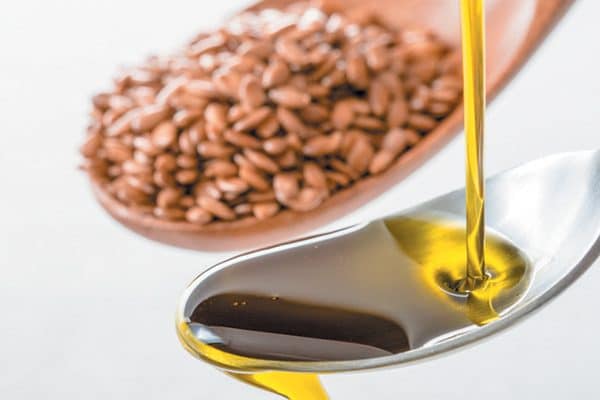The post Oils for Dogs: What to Know About Hempseed and Flaxseed Oil For Dogs by Diana Laverdure-Dunetz, MS appeared first on Dogster. Copying over entire articles infringes on copyright laws. You may not be aware of it, but all of these articles were assigned, contracted and paid for, so they aren’t considered public domain. However, we appreciate that you like the article and would love it if you continued sharing just the first paragraph of an article, then linking out to the rest of the piece on Dogster.com.
Recently, I found myself mesmerized by the oil aisle at my nearby health food store. Dozens of types of oils lined the shelves, enticing shoppers with their fancy names and innovative package designs. As my eyes glazed over, a light bulb went off in my head. Just as the popularity of oils for people has grown, so too has the popularity of oils for dogs. But, as with just about everything in life, more is not always better and can actually cause problems. Oils are necessary to maintain health, but the key is to use the right oils for dogs and to use them wisely.
There are two important oils for dogs that are often confused: hempseed oil and flaxseed oil. Both oils are rich in essential fatty acids (EFAs), which are fatty acids that dogs must get from their diets because they cannot produce them themselves.
Essential fatty acids

Understanding fatty acid composition can greatly improve how you use oil for dogs. Photography ©OlegMalyshev | Getty Images.
The first thing to know about oils for dogs? The two main EFAs found in hempseed and flaxseed oil are linoleic acid (LA) and alpha-linolenic acid (ALA). Both LA and ALA are found in plant sources and are polyunsaturated fatty acids (PUFAs). However, there are important distinctions between them.
Linoleic acid, or LA, is an essential omega-6 fatty acid. LA is the most important omega-6 fatty acid for dogs, because it serves as the precursor for the body to make other omega-6 fatty acids, including Gamma-Linolenic Acid (GLA).
GLA is a non-essential fatty acid with important benefits for the skin, as well as the potential to reduce inflammatory responses in the body and help treat conditions such as rheumatoid arthritis. Linoleic acid is also important for the health of a dog’s skin and coat, as it allows the skin to become permeable to water.
Alpha-linolenic, or ALA, is an essential omega-3 fatty acid with potent anti-inflammatory properties. It is especially credited with benefiting heart health and reducing the risk of high blood pressure. Some species are able to convert plant-based ALA to eicosapentaenoic acid (EPA) and docosahexaenoic acid (DHA), two anti-inflammatory essential omega-3 fatty acids found in fish and other marine sources.
However, because dogs do not efficiently make this conversion, they should consume preformed EPA and DHA. Hempseed and flaxseed oil both contain LA and ALA, but at very different levels. Understanding the fatty acid composition of these two oils can greatly improve how you use them and boost their desired health benefits.
Hempseed oil for dogs
Dietary hemp oil is produced by pressing the seeds from industrial hemp plants, a variety of the Cannabis genus. More than half (54 to 57 percent) of hemp oil’s fatty acid composition is made up of LA, while a far lesser amount (16 to 20 percent) is made up of ALA. Hemp oil is beneficial when used to balance the fats in ruminant- based diets.
Ruminants — including cattle, deer, sheep and goats — are grazing animals that chew and regurgitate their food multiple times, fermenting it in a specialized stomach called a rumen prior to digestion. Ruminant meat is naturally high in saturated fats and low in PUFAs. It turns out that the LA:ALA ratio of hemp oil is perfect for balancing the fats in ruminant-based diets.
Avoid adding hemp oil and other oils rich in LA, such as walnut, safflower, sunflower, soybean or corn oil, to poultry-based diets, as poultry contains naturally high levels of LA. Feeding additional LA in the form of dietary oils can throw off the diet’s omega- 6:omega-3 fatty acid ratio.
Note that dietary hemp oil is not the same as CBD, or cannabis, oil. While industrial hemp and CBD oil both come from the same cannabis species, CBD oil is extracted from the flowers, leaves and stalks of the plant, not the seeds. The seeds used for dietary hemp oil, while rich in essential fatty acids, do not contain medicinal properties.
Dose: Add 1 teaspoon hempseed oil per 1 to 1¼ pounds of meat.
Flaxseed oil for dogs

Flaxseed oil spoils quickly so be sure to store it properly when using it as an oil for dogs. Photography ©kazoka30 | Getty Images.
Flaxseed oil, also called linseed oil, is made from pressing the seeds of the flax plant, a cultivated crop grown in cooler climates. Flaxseed oil is pretty much the opposite of hempseed oil in its LA and ALA fatty acid composition.
The majority of flaxseed oil (about 57 percent) is made up of ALA — more than any other oil commonly consumed in North America. In contrast, only about 16 percent of flaxseed oil is made up of LA.
In addition to flaxseed oil’s anti-inflammatory effects, it has been shown to reduce symptoms of internal parasites, and higher doses may help relieve dry eye. Flaxseed oil acts as a blood thinner, so avoid in dogs prone to bleeding, and discontinue use well in advance of any surgical procedure, including dental cleanings.
Unlike hemp, flaxseed oil is perfect for balancing the fats in poultry-based diets, such as chicken and turkey, which contain naturally high levels of LA. Flaxseed oil gives poultry a nice boost of omega-3s in the form of ALA while avoiding adding excess omega- 6s in the form of LA. Flaxseed oil spoils quickly, so store in a dark container in the refrigerator.
Dose: Add 1 teaspoon flaxseed oil per 1 to 1¼ of lean poultry (without skin).
Thumbnail: Photography GlobalP | Getty Images.
Diana Laverdure- Dunetz, MS, is a canine nutritionist and co-author, with W. Jean Dodds, DVM, of two books, including Canine Nutrigenomics: The New Science of Feeding Your Dog for Optimum Health. Their online course, Complete Canine Nutrition, can be found at myhealthydog.dog.
Editor’s note: This article first appeared in Dogster magazine. Have you seen the new Dogster print magazine in stores? Or in the waiting room of your vet’s office? Subscribe now to get Dogster magazine delivered straight to you!
Read more about oils for dog on Dogster.com:
- Olive Oil for Dogs — 8 Reasons to Add It to Your Dog’s Diet
- Using Coconut Oil for a Dog’s Itchy Skin
- Coconut Oil for Dogs? 10 Reasons to Try It
The post Oils for Dogs: What to Know About Hempseed and Flaxseed Oil For Dogs by Diana Laverdure-Dunetz, MS appeared first on Dogster. Copying over entire articles infringes on copyright laws. You may not be aware of it, but all of these articles were assigned, contracted and paid for, so they aren’t considered public domain. However, we appreciate that you like the article and would love it if you continued sharing just the first paragraph of an article, then linking out to the rest of the piece on Dogster.com.
Original source: https://www.dogster.com/dog-health-care/hempseed-and-flaxseed-oils-for-dogs